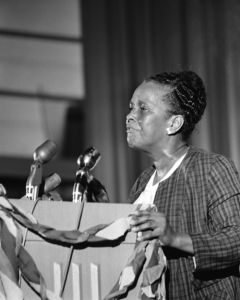
Ella Baker. Source: https://www.crfashionbook.com/celebrity/g29893632/ella-baker-activist-quotes/

John Dewey. Source: https://en.wikipedia.org/wiki/John_Dewey
The People’s Role in Organization: How Can We Create the Best Democracy?
Organization firstly depends on the public’s education
- The public (group of people with a common goal) must be able to identify itself. A democracy is meant to cater to the public’s problems, and unless they first identify themselves, they cannot organize a cohesive driving goal.
- The public can become educated by associating with one another, in order to lay a successful foundation for organization.
Democracy depends on the public’s success in organization
- It is the public’s subsequent duty to participate actively in its democracy, taking it upon themselves to educate themselves and form their own unique morals and opinions.
- Ella Baker called this idea “participatory democracy,” which, as the name suggests, emphasizes every individual speaking their opinions and participating in the democracy (Mueller, 2004, p. 79). A huge part of that is the public being conscious that their voices matter in the first place.
Leadership in organizing and democracies
- According to John Dewey, qualified people being the leaders makes sense. “Experts,” as he referred to them, are wise and qualified, demonstrating value of having an expert lead in the interest of the general public (Dewey, 1984, p. 365).
- There are potential downfalls of having an expert leader in charge. Intrinsic to these experts is a sense of losing touch with those who you represent. Regardless of how qualified an individual is to lead an organization or the public, no one knows the problems of the public better than the public itself. As Dewey puts it in a metaphor, “The man who wears the shoe knows best that it pinches and where it pinches, even if the expert shoemaker is the best judge of how the trouble is to be remedied,” (Dewey, 1984, p. 365).
- Ella Baker was diametrically opposed to the idea of a charismatic leader. She instead preached the idea of “group-centered leadership,” which fosters “the development of people who are interested not in being leaders as much as in developing leadership among other people,” (Payne, 1989, p. 892). In this way, Baker preferred leaders who were more of facilitators than instructors.
- The inherent dilemma that organization faces is the inevitable emergence of a leader. This is a perpetual issue inherent to organization and democracies in general because focal figures are necessary for the pushing of ideas in a clear way to ruling bodies, but the line where a leader becomes a demagogue is a blurry one.
So what is the best kind of leader for a democracy?
There will, perhaps, never be a perfect leader for democracy. It is nearly impossible to guarantee that the leader who emerges will be qualified without pushing ideas onto people. The perfect leader for a democracy is in fact the people, working as a single, constantly progressing unit. The public must find a balance in order to educate each other and enact laws selflessly. These things to create an ideal leader will not happen until the whole public engages with Baker’s and Dewey’s ideals.
